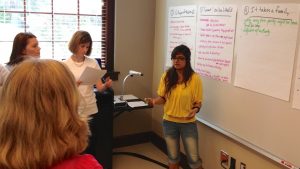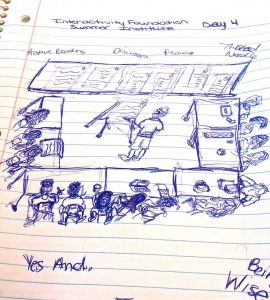 By Brooke Bennett-Day, Associate Professor of Psychology, Wesleyan College, Macon, Georgia.
By Brooke Bennett-Day, Associate Professor of Psychology, Wesleyan College, Macon, Georgia.
For the past four years, faculty at Wesleyan College in Macon, Georgia have taught a mandatory first-year seminar, the Wesleyan Integrative Seminar Experience (WISe), as part of a collaboration with the Interactivity Foundation (IF). Over these four years we have considered several different measures of the course’s impact. In addition to regular course evaluations, students have provided responses to a number of pre- and post-test measures; faculty have also provided feedback on student performance on IF skills at multiple points in a semester. These measures have given us some insight into the experience of the WISe students in their first semester at college. Here’s a quick overview of some of the selected findings across the four-year period of data collection.
The most promising recent findings involve the extent to which students and faculty perceive improvement in skills related to the IF techniques. Students believe their communication skills are much improved at the end of WISe. These skills include thinking of multiple ways to frame issues, summarizing major points, and being able to communicate effectively across cultures. Faculty ratings agree, with mean faculty ratings of students significantly improving overall from midterm to end of semester for each of the items. Faculty felt that students became better at divergent thinking, facilitating team contributions, cultural interactions, and facilitating a collaborative environment, among other IF-related skills.
Students also reflected on the overall use of the IF process within the classroom. Feedback was generally positive – item means were all above the midpoint on the scale. However, student ratings in 2014 were particularly positive, possibly reflecting the improvement that ideally comes with repeated iterations of a course. In that assessment year, 93% of students marked “agree” or “strongly agree” when asked if they felt that “this method of student learning, where students direct their own learning in small-group discussions, worked well in [their] class.” Students agreed that the small group made it more comfortable to talk about controversial issues (78% agree or strongly agree). Furthermore, 74% believed that they would be likely to use this technique in other classes.
As a whole, Wesleyan students are open to diversity – their scores on a related measure were consistently higher than those reported by a national comparison (around 4.2 compared to 3.8 on a 5-point scale). Starting with such a favorable rating is good, but also means interventions may not foster additional improvement. Still, over multiple years, 85-91% agreed or strongly agreed that it was valuable to hear about the diversity of other students’ experiences. The small group technique incorporated features that allowed students to comfortably talk about their own experiences, which then contributed to a learning experience students found worthwhile.
Given the IF focus on multiple perspectives, several measures examined students’ tolerance for ambiguity. In general this was one area in which students began the semester below the midpoint – it can be difficult for students to accept that there may not always be one clear answer to questions. Changes from pre-test to post-test for complete measures were hard to come by, but there were often individual items that showed some movement. For example, students consistently reported being okay with more uncertainty at the end of the semester. Similarly, in a couple of the samples, students demonstrated a greater tolerance for contradiction in their own behaviors. In other words, they were better able to understand that people might behave differently based on the people and situations around them.
Taken together, these findings suggest that the WISe/IF collaboration has positively impacted the  Wesleyan student experience in multiple ways. Both students and faculty report increased skill for students in a number of areas related to small group facilitation and communication. Students agree that small groups have allowed them to discuss issues that might be less comfortable if done in front of the full class. They appreciate diversity, and thus consider being able to hear about the diverse experiences of their classmates useful to their overall learning experience. Finally, their responses suggest some change in tolerance for ambiguity in their coursework and their lives. For more information about this experience, please contact the Interactivity Foundation directly.
Wesleyan student experience in multiple ways. Both students and faculty report increased skill for students in a number of areas related to small group facilitation and communication. Students agree that small groups have allowed them to discuss issues that might be less comfortable if done in front of the full class. They appreciate diversity, and thus consider being able to hear about the diverse experiences of their classmates useful to their overall learning experience. Finally, their responses suggest some change in tolerance for ambiguity in their coursework and their lives. For more information about this experience, please contact the Interactivity Foundation directly.



